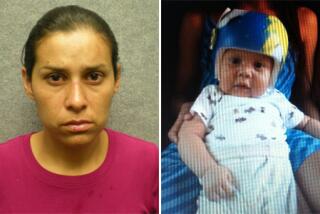Wife Gets 6-Year Term in Slaying of Abusive Husband
- Share via
VENTURA — Calling it one of the most difficult sentencing decisions he has ever made, Ventura County Superior Court Judge Vincent O’Neill sentenced an Oxnard woman to six years in prison Wednesday for shooting her estranged and abusive husband nearly two months ago.
The judge said he gave strong consideration to Edna Reyes’ lack of a prior criminal record, her statements of remorse and regret, and evidence that she is suffering from battered women’s syndrome.
But the fact that she shot her husband with her .45-caliber revolver in front of two Oxnard police officers when there was no appearance of imminent danger was also a strong factor in his decision, he added.
“If I felt that something I could do in passing this sentence would stop the type of behavior that Ms. Reyes has been subjected to from occurring, I would do that,” O’Neill said. “But I don’t have that power.”
Although prosecutors had asked for a sentence of 16 years for the mother of four, Deputy Dist. Atty. Maeve Fox said she was satisfied with O’Neill’s decision. “Overall, I think it is appropriate,” Fox said.
Court officials said Reyes could serve about 85% of her sentence. An illegal immigrant and farm worker, she faces deportation when she is released from prison.
Defense attorney Jean Farley, who had argued that Reyes should receive probation, said that she was depressed and saddened by the decision, but that her client was taking it well.
“She feels it is the will of God,” said Farley, who previously described Reyes as a deeply religious person.
Adding that she felt the judge made his decision in a “judicious and dignified” manner, Farley stated that she nonetheless will ask Gov. Pete Wilson for a pardon for Reyes, whose children are ages 3 to 11.
Advocates for battered women who attended both days of the sentencing hearing were less restrained in criticizing the sentence.
“It’s unjust,” said Maria Mercedes Garcia of the Farm Worker Women’s Leadership Program, an advocacy group for farm worker women. “The only ones that are going to suffer are the children. They should have given her the opportunity to be with her children. Now they don’t have a father or a mother.”
Reyes, 29, was originally charged with murder for shooting her husband, but the charge was reduced after considering the history of abuse she had endured throughout their 12-year marriage, according to prosecutors.
She was arrested July 5 after shooting her husband, Martin Reyes, twice in the chest in front of two Oxnard police officers and her 11-year-old son after a domestic disturbance call. Martin Reyes had a long history of physically abusing her and their children.
Wednesday, Fox described the events before the shooting:
Edna Reyes and her father had purchased two guns. The first failed to work when Reyes and her father tried it out at a field in Oxnard. So they went to a friend and purchased a 1917 Army .45-caliber revolver for protection.
Fox also said Edna Reyes and her husband had not been fighting on the night he died. Fox said that when Edna Reyes went into her house to pack her belongings, she loaded her revolver and asked herself, “Do I do this now or do I go to a shelter?”
Fox said that there were no records of serious injuries to Edna Reyes in any of the medical or police reports and that Reyes knew how to use the system to her advantage.
“She didn’t somehow slip through the cracks of the system,” Fox said. “She had so many alternatives even at that moment. . . . There comes a point when we have to draw the line between victimization and personal responsibility.”
But Farley said her client was terrified of her husband, who had a blood-alcohol level of 0.18% on the night he died, more than twice the legal intoxication limit. Edna Reyes also feared that her children would be taken away by the Department of Children’s Services if her husband continued to live with them, because of the allegations of abuse.
Tammy Bruce, president of the Women’s Progress Alliance, a nonprofit women’s advocacy group, said the Reyes case is an example of a woman who felt there was no other way out. “Women do that only when they are pushed to the breaking point,” Bruce said.
More to Read
Sign up for Essential California
The most important California stories and recommendations in your inbox every morning.
You may occasionally receive promotional content from the Los Angeles Times.










